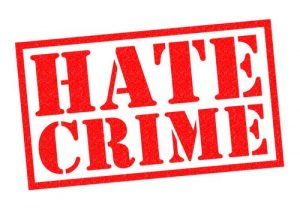
It is most concerning that in National Hate Crime awareness week, we are faced with news that religious hate crime is dramatically rising according to police figures. Of course, as is always the case, the story behind the statistics may be more complicated. There is, undoubtedly, room for debate about whether the apparent rise is, at least in part, due to changes in the way that offences are being recorded. It may be that police forces are now more likely to recognise and categorise incidents as hate crime, when previously they slipped under the radar, but irrespective of these technicalities, there is no escaping from the uncomfortable reality that religious hate crime is all too real in our society.
Given what we know about soaring Islamophobia and Anti-Semitism, it unfortunately isn’t a great surprise to learn that Muslims and Jewish citizens are amongst victims of this trend, and nobody in the UK, or indeed the Western world, could have failed to notice the growth in bigotry and persecution which these two groups have had to endure in recent decades. Nevertheless, our familiarity with a problem should only increase our collective sense of moral responsibility to do something about it, and even though these two groups are currently suffering intense and sustained attack, it remains striking how diverse the victims of hate-crime were in the latest statistics. In fact, Buddhists, Hindus, Christian, Sikhs and those of ‘no religion’ were also on the receiving end of abuse from other citizens.
We are not sociologists or criminologists, and would not want to stray into their territory when it comes to tackling the causes of these incidents, but there are two points which we think are worthy of note from a legal point of view.
Firstly, we would want to emphasise that in order to be categorised as a hate crime, an event must have involved someone behaving in a way which actually crossed the threshold of criminal responsibility. Not every hostile, unkind, negative or even abusive comment will amount to a hate crime. Of course, it is possible to say and do some very unpleasant things without breaking the law, and in a free society, that is only right and proper, and although most of us would prefer it if people didn’t use their freedom of expression to parade their ignorance, hostility and prejudice, we recognise their right to do so, at least within certain parameters. Therefore, given that we protect the liberty of those with minority views to express their opinions, even anti-religious or racist ones, behaviour which constitutes a hate crime is by its very nature extremely serious. In other words, it is so appalling that it justifies the State stepping in to restrict freedom of expression. Secondly, these statistics prove that nobody is safe. It doesn’t matter whether you are Muslim, Agnostic, Pagan or whatever else, because someone may come along and subject you to abuse because they have a problem with your identity or beliefs.
Crucially though, the flip side of the coin is that everybody enjoys equal protection from the law. Whatever your faith or worldview, it is recognised as a characteristic requiring respect, in just the same way as your gender or racial identity. The law does not operate to shield some special groups, and it exists to ensure that everyone is equally free to live their lives in security and peace. It is reassuring that human rights, including the right to freedom of religion and belief, exist for all of us.
Related Articles
Religious Hate Crimes: Rise in offences recorded by police (BBC News 17/10/18)
More than 100 Anti-Semitic incidents recorded in UK every month as bigots ‘become more confident’ (The Independent 26/7/18)
National Hate Crime Awareness Week 2018 (Stop Hate)


